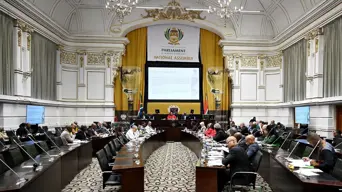Size of Parly committees pegged at 11 MPs to accommodate smaller parties
Committees are expected to meet soon to elect chairpersons so they can get down to business.

Picture: @ParliamentofRSA/X
CAPE TOWN - An expanded Cabinet has meant more portfolio committees in Parliament.
But it also means smaller parties, with only a few members, will be scrambling to conduct proper oversight across 30 committees.
These committees are often referred to as the engine rooms of Parliament for their oversight role and the scrutinising of proposed legislation.
The number of Parliament portfolio committees has increased from 27 in the previous administration to 30 to accommodate portfolios that have been separated and where new ones have been created, like electricity and energy.
These exclude permanent standing committees of the House, like finance, and joint standing committees like the one on intelligence, and members’ ethics.
After agreeing last week to expand the membership of committees from 11 to 15 MPs, political parties have now agreed to stick to 11, especially to accommodate smaller parties who won’t be able to participate in all of them.
The Economic Freedom Fighters (EFF)'s Veronica Mente said that the Government of National Unity (GNU) partnership would impact on the work of Parliament.
"The bigger parties that are occupying more positions in the executive and they are still going to occupy more positions in the administrative committees of Parliament, they are going to have less numbers, which is going to result in committees sitting once a week even if they can sit twice a week to deal with the workload."
Committees are expected to meet soon to elect chairpersons so they can get down to business.
But with GNU partners expected to chair some of these committees for the first time in Parliament's history, the wrangling over seats could delay the first meetings.